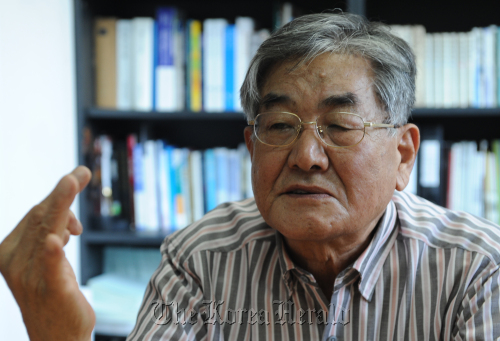Prepares for conference in Geneva to highlight political prisons and abduction issues
Countless North Koreans cross the river border to China even at this moment, and only a fraction of them make it safely to the South.
Some get arrested by the Chinese authorities and sent back to the North, some put up with inhumane treatment in China to avoid repatriation, while others risk their lives to move on to Russia or Southeast Asia.
Countless North Koreans cross the river border to China even at this moment, and only a fraction of them make it safely to the South.
Some get arrested by the Chinese authorities and sent back to the North, some put up with inhumane treatment in China to avoid repatriation, while others risk their lives to move on to Russia or Southeast Asia.

One of the key roles of the Citizens’ Alliance for North Korean Human Rights, led by Rev. Yoon Hyun, is to provide North Korean refugees in third countries with food, medicine and safe places to stay in.
“We have helped, directly or indirectly, about 350 refugees arrive in South Korea so far,” Yoon told The Korea Herald.
The nongovernmental organization relies solely on donations it receives to provide relief goods to North Korean refugees in third countries.
The NKHR also runs the Hangyoreh Summer and Winter School for young North Korean settlers here and a variety of educational programs for them in addition to raising international awareness of the seriousness of the human rights condition in the North.
Since 1999, it has organized annual conferences on North Korean human rights and refugees across continents.
This year, it is preparing to hold the conference in Geneva, Switzerland, in November.
“We plan to take North Korean refugees to the conference this time and give them a chance to answer questions from people working in the United Nations in order to let them see for themselves if the refugees and survivors of concentration camps for political prisoners are lying or exaggerating,” Yoon said.
The first session in Geneva will be about the North Korean political prison camps, where the refugees who get caught are sent to. The second session will be on the abduction issue, which is getting renewed attention lately.
North Korea is believed to have abducted and held about 500 South Koreans since the end of the 1950-53 Korean War ― most of them fishermen taken while fishing near the maritime border.
“Former Japanese prime minister Koizumi met with Kim Jong-il (in 2002) and got him to admit the abduction of a much smaller number of Japanese citizens, but the South Korean government couldn’t even do that,” Yoon said.
“It is a shame that the former Kim Dae-jung and Roh Moo-hyun administrations who championed human rights and struggle for democracy failed to say a word to the North about the abduction issue.”
Yoon, 82, has devoted his life to human rights and democratization.
He played a leading role in opening the Korean branch of Amnesty International in 1972 and let the world know about the imprisonment and oppression of those who fought for democracy in South Korea under authoritarian rule in the 1970s and the 1980s.
While doing a radio program on the changes and democratization movements in the Communist world in 1983, he met with North Korean defectors who had heard his program while hiding out in China. Yoon gradually grew more aware of the human rights condition in the North, and the NKHR was launched in 1996.
“For the first five years, it was like a shout in the wilderness (by the biblical John the Baptist); there was no response at all to our calls for awareness,” he said.
“The first response came in 2002 when then president of the Czech Republic Vaclav Havel, who had led democratization movements under the former communist government of Czechoslovakia, met with our delegation. He made speeches at the U.N. for the need of international action against human rights abuse in the North and is still helping us.”
Under the authoritarian administrations of Park Chung-hee, Chun Doo-hwan and Roh Tae-woo, the South had tended to exaggerate when criticizing the North, according to Yoon.
“The Human Rights Watch issued their first North Korean human rights report in 1988, and they wrote in its preface that North Korea-related information coming from the South required cautious review as they were unreliable,” he said.
Thanks to numerous surveys, constant lobbying and efforts to raise awareness over the years, the U.N. General Assembly has adopted resolutions denouncing human rights violations in North Korea annually since 2006. Last year, the resolution was adopted in a 103-18 vote with 60 abstentions.
“We aim to raise the yes votes to over 120 through continued lobbying and international conferences. It is all a matter of patience,” Yoon said.
“We never imagined the Soviet Union would collapse. Who knows what will happen to the North Korean regime?”
By Kim So-hyun (sophie@heraldcorp.com)

















![[KH Explains] Hyundai's full hybrid edge to pay off amid slow transition to pure EVs](http://res.heraldm.com/phpwas/restmb_idxmake.php?idx=652&simg=/content/image/2024/04/18/20240418050645_0.jpg&u=20240418181020)

![[Today’s K-pop] Zico drops snippet of collaboration with Jennie](http://res.heraldm.com/phpwas/restmb_idxmake.php?idx=642&simg=/content/image/2024/04/18/20240418050702_0.jpg&u=)